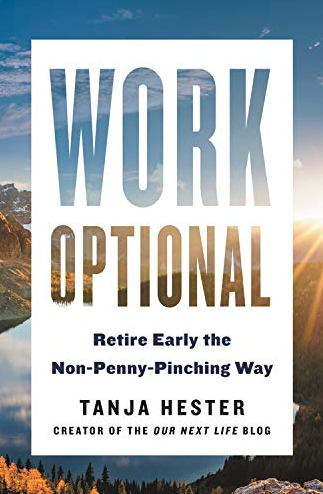Tanja Hester's Work Optional gets it right by putting money second
In Work Optional, Tanja Hester recalls her story of early retirement at 38 (and her husband's at 41) through a heart-felt look at reality and reason.

Pop quiz: What's the difference between an author who just writes about early retirement and one who's actually retired early?

The difference is the author who has retired early understands it enough to put the money aspect of this business second.
And, that's exactly what Our Next Life blogger and author Tanja Hester did in her book Work Optional: Retire Early the Non-Penny-Pinching Way.
As she writes in Chapter 12, "I'm not a financial professional, after all, just a nerd who does her homework. I wanted to write this book because I wanted the conversation about early retirement to be about life and not just about money.
Money is a critical aspect of early retirement, but it's also not the element that most people get wrong. Though exceptions apply, not many people in early retirement choose to go back to work because they ran out of money.
They go back to work because they merely retired from something rather than retiring TO a better way of life. Without purpose, early retirement will eat you alive, and in Work Optional, Tanja sets out on a journey that puts the softer side of early retirement first.
Because that's the part that most people get dreadfully wrong.
Work Optional, by Tanja Hester
In Chapter 1, Tanja recalls her journey through life as a "gold-star seeking overachiever", hell-bent on being the best in virtually everything that she does.
Yup, we're talking about straight As and editor of the school newspaper. But, she took it a step further (as overachievers typically do) as a champion "mathlete" and perpetually aiming toward the next best thing.
And, that included her job out of college.
After advice from her mentors to NOT follow in their footsteps (who worked in positions that she wanted, no less!), Tanja recalls, she, unknowingly at the time, got her first glimpse into what it truly means to be happy.
And for her, like it was for me, it didn't include a long career working in corporate America, burning through 10 or more hours a day in a job that consumed your ever-waking moment, pounding every ounce of energy out of you until you're left as a smoldering and microscopic version of your true self every weekend.
Drained of energy. Dreading the next Monday.
Most people understand this element of early retirement. They want to escape from the demands of the corporate world. They want to take full control of their own time and regain that child-like freedom that they used to enjoy.
Yup, most aspiring Work Optional folks understand that point.
But, Tanja's book breaks through conventional wisdom by NOT immediately jumping to the money aspect of early retirement. Of savings accounts and 401ks, of the Roth backdoor ladder and compound interest.
Just wait...back the damn truck up.
We're putting the cart in front of the horse. There's a much more important element of early retirement that needs to be addressed first, and that's exactly what Tanja's book addresses in the first three chapters.
Define your work optional life
In Chapter 2, we learn about the most important piece of early retirement: Defining what we're going to do.
What will your day-to-day life look like? What's going to make you happy when you are finally in full control of every minute of your day?
Believe it or not, these are much tougher questions to answer than it may seem. Most people skip this step, and for some, it sends them right back into the working world because they lack purpose after quitting their jobs and ending their careers.
Tanja asks questions like:
- When are you the happiest?
- What did you dream of doing when you were a kid?
- After you're gone, how do you want to be remembered?
- What makes you feel best about yourself outside of your work?
- What timelines or milestones carry particular significance in your life?
We're building a theme to our existence after early retirement, and we put those elements together into something that will, hopefully, closely resemble our reason for getting out of bed after we end our careers.
Here's a remarkable truth about purpose: It's not just about you.
Yes, your purpose in life is incredibly important, but it also doesn't stop there. Your money also carries a purpose and it becomes what Tanja calls your "Money Mission Statement", in Chapter 3.
Your money mission statement
Your money mission statement is the natural follow-on to what we laid out in the previous chapter, but instead of asking what makes YOU happy, we're talking about how money directly effects our happiness.
For example, what's the best thing that you've ever spent money on? Or, was there a point in your life that you enjoyed MORE than you do now, but also spent less money?
If your money is a crutch that aids a bad spending habit that isn't deep-seeded in happiness and purpose, early retirement isn't going to fix it.
And, that's the point that so many authors miss, but Tanja doesn't.
She isn't "selling you" early retirement. As an early retiree, she carefully explains that early retirement isn't a catch-all fix to whatever ails you, and without a meaningful understanding of what makes you happy, you likely won't find yourself any happier after ending your career.
This book helps you figure out what you need to know.
The money aspect
Tanja does spend several chapters talking about money. In Chapter 4, she talks about investing in your future by discussing the deceivingly basic tenants of building wealth, which have nothing to do with striking it rich in the lottery or get rich quick schemes.
For example, you don't need to beat the market. Instead, just keep up with it. And, you don't need to "get lucky" by hitting it big. This isn't a sprint.
And lastly, inflation eats away our spending power over time, and it's important that investments take a front seat in your wealth-building plan.
As one of the perennial authorities on healthcare, she talks about healthcare in early retirement and how to plan for the bigger comforts of life.
Specifically, you learn about:
- COBRA
- The healthcare exchange
- Managed care plans
- Health-sharing ministries (we use one - Liberty)
- Healthcare tourism (we've done this!)
- Medicare
Healthcare is an utterly confusing topic even when you're working a full-time job and have access to "designer" healthcare plans. In early retirement, though, it gets even worse and I don't know of any early retirement author that discusses the issue of healthcare with as much knowledge or sincerity as Tanja.
Do you need this book?
If you think you've got everything figured out, then don't buy the book. Rest assured that you'll do well in early retirement and don't need the advice or insight from someone else who's actually done it.
For everyone else, pick up a copy if for no other reason than it was written by someone who practices what she preaches.
She isn't some highly-paid motivational speaker or coerced follower of the almighty dollar who just whipped together a book that talks about a controversial topic.
Instead, Tanja comes at this from a position of experience. She retired at 38 (and her husband Mark at 41 - whom I know are BOTH excellent at trivia) after working careers in corporate America.
In this book, you will learn:
- that early retirement is more than just having enough money
- how to build your post-retirement life before quitting your job
- that a purpose-filled life is more important than not having a job
- how to design a money management system that works for you
- that quitting a life-long career is harder than it looks, but worth it
This book is one of the only books that actually matches the reality of early retirement and the emotions of ending your career. It's something that too few of us talk about, especially in published books.
Another appropriate title for this book? "The realities of early retirement that nobody likes to talk about, but I will because I've f'ing done it".
Pick up a copy for yourself.
